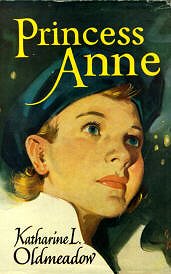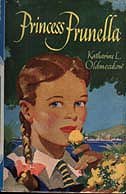| bc | Katherine
L. Oldmeadow, 1878 - 1963, aka 'Pamela Grant', Born Chester, Cheshire,
England
Katharine Louise Oldmeadow was the youngest child of at least three brothers and five sisters. Little is known of her although she did live in Highcliffe near Christchurch, on the borders of the New Forest, as this is where she died. Katharine used both Chester and the New Forest as locations in her books; she also wrote as 'Pamela Grant'.
FURTHER INFORMATION 12/08/2001 I maybe able to add a little more to your biographical details of Miss Oldmeadow, we have just taken down an exhibition at Highcliffe Castle which had a board about her. Katharine Louise Oldmeadow (1878 - 1963) She was equally at home in the drawing room at Highcliffe Castle where she would visit Violet Stuart Wortley CBE or in a gypsy's shack at Thorney Hill in the New Forest where she would mix with the gypsies collecting information. They helped her with The Folklore of Herbs written in 1946. Many of her books and especially those dealing with fairies are based on her home and the Chewton Glen. #
True, there isn't much dramatic tension, for the heroine is never truly either in physical danger or emotional turbulence from the beginning of the book to the end. However, there are many wish-fulfilment episodes that are interesting to read about. It is also fascinating that the social class of Prunella is more difficult to pin down than one would expect. She belongs to a typical suburban family, attends a girls' day-school and has fairly ordinary parents who are not particularly well-off. On the one hand the family holiday in Cromer has to be cancelled because so much money has been spent on Prunella's journey to France and her time in the sun so that she could recover from her lingering illness, yet, on the other, the family has a maid and a charwoman who are both suitably grateful when Prunella brings them back trivial presents from abroad. Looked at more closely, it becomes clear that Prunella's journey to France is also a journey of self-discovery. At the beginning of the book her illness and protracted convalescence have made her tremendously introverted, selfish and even maudlin. She visualises her own death-bed scene in glorious and attractive detail. However, her arrival in France and her meeting with the obnoxious Trixy Bell almost immediately grants her the gift "to see ourselves as others see us" that starts her on the straight road to recovery. When Trixy complains about the curtains being drawn back in the morning it starts her thinking, "This was very much like the way Prunella had been talking to her long-suffering family for weeks, and it gave her quite a shock to hear how unpleasant it sounded, for the "child's" peevish tones were not by any means attractive." Prunella finds very quickly that she is by far the most sensible and reliable one amongst the six females at the unofficial school that she has joined on the Mediterranean coast of France. This includes Miss Angela Burke, the proprietor and sole teacher of the strange academy where the curriculum consists entirely of painting and picnicking. This lady is erratic and artistic but full of good intentions and a genuine desire to do the right thing by the girls in her charge. Prunella thrives in this atmosphere. "Prunella threw off all her invalid ways – Trixy was an excellent object lesson ! – and after three weeks of outdoor life in the sunshine her complexion was no longer like a mustard plaster …" The only French girl at the academy, Lisette, proves to be an interesting character – a mixture of selfishness, chic style and reckless irresponsibility. She is determined to learn English and refuses to speak French to Prunella, who is determined to conquer that language in reality rather than just in text books. It is Lisette who provokes the others into the more daring activities, for she constantly needles the English girls about how they don't live up to the heroines of the books she has read about schoolgirls in Britain. Thus the much-provoked Diana gets all the others to join her in a swimming party on Christmas Eve. The result is a minor disaster, for when they return to shore nearly all their clothes have disappeared. It is poor Prunella who has to take her courage (and a bath-towel) in her hands and go for help. She forces herself to speak French and saves the situation. For her reward Lisette agrees to talk in her native language "la plus belle des langues existant dans le monde" for one hour a day. In fact quite a lot of fun is had with the language question in this novel. Before she even ventures abroad Prunella is forced by Miss Barnes, the kind but fussy lady who has made all the arrangements, to learn all the ridiculous items from a phrase-book. At once Prunella's family seize upon every opportunity to tease her about this. "Waiter ! Bring me an egg boiled – poached – raw," Alec would cry at breakfast, while Nancy shrieked for a glass of beer and a foot-warmer, and Mr. Roydon clamoured for a doctor and an ice, and Jack and Jill noisily demanded to be shown the way to the Turkish baths." However, once in France, other instances of Prunella's emotional courage occur at regular intervals. A party with the children from the local French school goes disastrously wrong when one of the little boys appears to have swallowed a china model of a king that was placed in a traditional twelfth night cake. He is hurried away by his indignant teacher and an X-ray and operation seem inevitable. However, the china king is found and once again Prunella is the one asked to go to the French school and explain that little Henri is alright after all. At first she refuses but then, "Prunella relented too. What a selfish little wretch she was not to want to do something for Angela, who was such a dear and had given her this lovely time in France and cured her of all her silly little invalid ways." Virtue indeed brings its own rewards. The sensible headmistress of the French school treats her with respect and again Prunella grows a little more in her own confidence. Her kindness to the new girl, Roseline, who has run away from her previous school, is what the reader comes to expect from this unorthodox heroine. However, events then take an unusual turn for, hoping to comfort the unfortunate Roseline, she presents her with a picture of a beautiful saint who shares her name. Under the influence of Lisette, Roseline decides that she will become a person worthy of canonisation. Her first act is to give away all her worldly possessions to the other girls. Typically the awful Trixy exploits this opportunity to the full, seizing in her arms as much loot as she can carry. Later Roseline decides to expiate her sins by walking barefooted along the rough coastal path. This results in two bleeding feet and the humiliating comment from Diana that if she really felt sorry she would go and apologise for all the trouble she had caused. "Roseline went quite pale, for Diana's blunt speech revealed to her in a flash the awful truth, that, painful as her penance had been, she would rather have endured it than face the detested Madame Le Bon and apologise for her sins." Later the author makes the readers shift their feelings once again as Roseline and Prunella have to sit through a ghastly French meal in an airless room in Cannes surrounded by chattering girls who relish their food. There is no pretence by this author that everything French is wonderful and the reality of keeping up appearances under intense and thoughtless pressure is captured very well indeed. The propensity for the French to ride on trains with the windows jammed shut has already made the girls feel weak. The food is the last straw and one's sympathies are entirely with Roseline, who is so physically weak, and Prunella, who is so self-sacrificing that she will look her companion after no matter what happens and how much she wanted to see the celebrated tennis match. Once again she is rewarded and spends the afternoon helping out at a French salon, dressing as a mannequin and helping to clinch an important sale. Before her return to England Prunella has become a girl transformed , though still essentially English. The writer reinforces this idea by a rather clever extended metaphor. The sun has brought about Prunella's physical and spiritual growth and the theme for the carriage that the girls enter for the Battle of the Flowers in the local fete is "le soleil". Some of the girls are golden haired and, in a fit of reckless enthusiasm, Diana decides to dye the hair of the others to transform them into "sun-maidens" for the day. Prunella's hair is nut-brown and she is reluctant to change. For once she goes against her instincts, for Diana is insistent that it will please Angela, her kind hostess, "so all Prunella could do was be a sport and hope for the best." Of course, it all goes disastrously wrong, though the day itself, when Prunella has returned to her normal self, is another triumph. The return to England is made tremendously sentimental by a chapter entitled, "This is my own, my native land", and by a description of Prunella's delight in her very English father. "He didn't dart about and wave his arms, nor kiss his wandering daughter on both cheeks, crying, "Ma petite – mon ange, enfin ! c'est toi." He simply said, "Well, my dear – here you are again," and kissed her lovingly, and then did all the right things….." The last section of the book is rather a surprise for the author extends the story into discussing what happens after Prunella gets back and describes in detail the visit of Lisette to the Roydon family. This allows the reader to see that Prunella is now a flower that won't just bloom only in the sun. The maturity with which she deals with her own family, even showing them the way in which they must treat old Miss Barnes, who is very kind but very time-consuming, is sensitively portrayed. Lisette's visit, where she keeps her Frenchness intact whilst enjoying every minute, is enlivened by her quarrels with Prunella's very English brother, Alec. In the end he pays her the ultimate compliment by telling her she's "a sport" and the Entente Cordiale is well established by the last page of the book. Indeed, throughout the book, nothing remarkable has happened. All the escapades have been kept within reasonable and plausible bounds. The last words of the book are "Vive la France" but Katharine L. Oldmeadow has shown us that what she was really interested in was "Vive la difference !" both between the two nations and between the two Prunellas – the sick, self-pitying frump and the elegant, good-humoured princess of the title. # |
bc |

